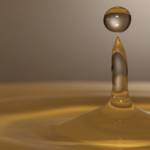Feeding Horses Mineral Oil

Veterinarians often use mineral oil as partial treatment for impaction colic. Given through a nasogastric tube as a large bolus, mineral oil helps the horse pass the impacted mass. Mineral oil is not absorbed in the digestive tract of the horse, so it reaches the hindgut intact and can act on the impaction site.
Horse owners will occasionally add mineral oil to a horse’s diet in an effort to prevent or manage mild colic episodes. Because mineral oil is inert and therefore indigestible, it offers no nutritional value.
No recommendations regarding how much mineral oil to feed have been published. Most horses will not voluntarily consume large amounts of mineral oil, and horse owners should be advised not to administer it orally by nasogastric tube due to the risk of causing aspiration pneumonia. Feeding large amounts of mineral oil daily may decrease the digestion and absorption of fat-soluble vitamins (vitamins A, D, E and K).
For horses prone to recurrent colic, there are more appropriate management and feeding practices that can help reduce the risk associated with gastrointestinal problems, including increased turnout time, near-constant access to high-quality forage, and a reduction in the size of grain meals.
Adding a digestive supplement can be a beneficial preventive measure for horses that have a history of colic and for those without a history but with a greater risk due to management.
EquiShure, developed by Kentucky Equine Research (KER) to support the digestive health of the hindgut, reaches the hindgut through patented, encapsulation technology. Once delivered to the hindgut, EquiShure acts to buffer excessive acid and maintain a more stable environment for optimal digestive function.
In addition to EquiShure, which is available to horse owners worldwide, RiteTrac is a total-tract digestive supplement that targets both the stomach and the hindgut, which is comprised of the cecum and colon. Also developed by KER, RiteTrac is available in the U.S.








